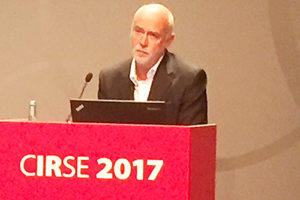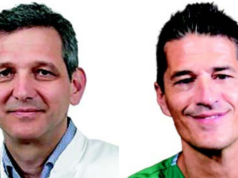
The world’s largest randomised trial comparing three central venous access devices—peripherally inserted central catheters (PICCs), Hickman-type devices and chest wall ports—should provide definitive results in terms of their relative efficacy and cost-effectiveness, Jon Moss, Glasgow, UK, told CIRSE delegates.
The CAVA (Cancer and venous access) trial is a National Institute of Health Research- funded randomised controlled trial with associated qualitative research of venous access devices that deliver long-term chemotherapy. It is an open, multicentre trial with 17 participating UK sites involving 1,500 patients who received chemotherapy for three months, or more. The trial is currently recruiting and patients will be followed for a year.
“There are four randomisation options available for eligible patients (PICC vs. Port, PICC vs. Hickman, Hickman vs. Port, and PICC vs. Port vs. Hickman). We preferred the third option, but if one device was not suitable for, or refused by a patient, the other two-way comparisons could be used. The PICC vs. Hickman arm was a non-inferiority comparison, and the other options were a superiority comparison,” said Moss, who is a professor of Radiology at NHS Greater Glasgow and Clyde.
The primary outcome measure is complications. Secondary endpoints include venous thrombosis, re-intervention rates (device removal and replacement), interruptions to chemotherapy delivery, time to first complication and quality of life. Health-related quality of life including a novel device specific instrument and a full health economic analysis outcome, including cost effectiveness are being performed.
Baseline characteristics
“To date, we have randomised nearly 1,000 patients, and the Hickman vs. Port comparison has been closed. The baseline patient characteristics are adults who are 18 years of age, or above, with either a solid or haematological malignancy who are scheduled to receive a course of chemotherapy lasting a minimum of three months. The three most common cancer types are colorectal, breast and pancreas, in that order. The trial closes to recruitment in February 2018 with a maximum follow up of 12 months. The results should be available in early 2019,” Moss told Interventional News.











